Should You Sell or Rent? Understanding Your Best Option in Today’s Market
Deciding whether to sell or rent your home is a significant financial decision that depends on multiple factors, including market trends, personal circumstances, and long-term investment goals. While selling provides immediate liquidity, renting can generate passive income and build long-term wealth. In this guide, we’ll break down the pros and cons of selling vs. renting to help you make the best decision for your property.
Evaluating the Current Market Conditions
Before deciding whether to sell or rent, it’s crucial to assess your local real estate market and rental demand. Key factors to consider include:
- Home Prices: Are property values increasing or stabilizing?
- Rental Demand: Is there a strong market for rentals in your area?
- Mortgage Rates: Higher rates may make renting a better short-term option.
- Property Appreciation: Will your home likely increase in value over time?
- Tax Implications: Consider the tax benefits or liabilities of both options.
- Home Prices: Are property values increasing or stabilizing?
- Rental Demand: Is there a strong market for rentals in your area?
- Mortgage Rates: Higher rates may make renting a better short-term option.
- Property Appreciation: Will your home likely increase in value over time?
- Tax Implications: Consider the tax benefits or liabilities of both options.
The Benefits of Selling Your Home
Selling may be the right choice if you’re looking for immediate financial gain or want to move on without the responsibilities of a landlord. Here’s why selling could be beneficial:
Pros of Selling:
- Immediate Cash Flow – Selling provides a lump sum of money that can be reinvested or used for other financial needs.
- No Landlord Responsibilities – Avoid the hassle of property management, maintenance, and tenant concerns.
- Take Advantage of Market Conditions – If home prices are high, selling now could maximize your return on investment.
- Eliminate Holding Costs – Selling removes ongoing expenses such as property taxes, insurance, and maintenance costs.
Pros of Selling:
- Immediate Cash Flow – Selling provides a lump sum of money that can be reinvested or used for other financial needs.
- No Landlord Responsibilities – Avoid the hassle of property management, maintenance, and tenant concerns.
- Take Advantage of Market Conditions – If home prices are high, selling now could maximize your return on investment.
- Eliminate Holding Costs – Selling removes ongoing expenses such as property taxes, insurance, and maintenance costs.
Cons of Selling:
- Loss of Passive Income – You won’t benefit from monthly rental earnings.
- Transaction Costs – Realtor fees, closing costs, and capital gains taxes can impact net profits.
- Future Appreciation Potential – Selling now means you may miss out on property value growth in the future.
- Transaction Costs – Realtor fees, closing costs, and capital gains taxes can impact net profits.
- Future Appreciation Potential – Selling now means you may miss out on property value growth in the future.
The Benefits of Renting Your Home
Renting out your property can provide a steady income stream and allow you to retain ownership for long-term financial gain. Here’s why renting may be a good idea:
Pros of Renting:
- Passive Income Stream – Monthly rental payments can supplement your income and help cover mortgage costs.
- Property Value Growth – Holding onto your home allows you to benefit from future appreciation.
- Tax Advantages – Many expenses related to rental properties, including maintenance, mortgage interest, and depreciation, may be tax-deductible.
- Flexibility – If you’re unsure about selling, renting allows you to generate income while keeping your options open.
Cons of Renting:
- Tenant Management – Dealing with tenants, repairs, and vacancies can be time-consuming and stressful.
- Upfront Investment – Preparing the home for renters may require maintenance, updates, and marketing costs.
- Market Risks – Rental income is not guaranteed, and market downturns could affect profitability.
- Legal Responsibilities – Being a landlord means staying compliant with rental laws and regulations.
Pros of Renting:
- Passive Income Stream – Monthly rental payments can supplement your income and help cover mortgage costs.
- Property Value Growth – Holding onto your home allows you to benefit from future appreciation.
- Tax Advantages – Many expenses related to rental properties, including maintenance, mortgage interest, and depreciation, may be tax-deductible.
- Flexibility – If you’re unsure about selling, renting allows you to generate income while keeping your options open.
Cons of Renting:
- Tenant Management – Dealing with tenants, repairs, and vacancies can be time-consuming and stressful.
- Upfront Investment – Preparing the home for renters may require maintenance, updates, and marketing costs.
- Market Risks – Rental income is not guaranteed, and market downturns could affect profitability.
- Legal Responsibilities – Being a landlord means staying compliant with rental laws and regulations.
How to Decide: Key Considerations
If you’re still unsure whether to sell or rent, ask yourself these questions:
1. Do you need immediate financial liquidity, or are you willing to wait for long-term gains?
2. Is there strong rental demand in your area to make renting profitable?*
3. Are you prepared to handle tenant management or hire a property manager?
4. How does the local market impact your ability to sell at a favorable price?**
5. What are the tax implications of selling vs. renting your property?
1. Do you need immediate financial liquidity, or are you willing to wait for long-term gains?
2. Is there strong rental demand in your area to make renting profitable?*
3. Are you prepared to handle tenant management or hire a property manager?
4. How does the local market impact your ability to sell at a favorable price?**
5. What are the tax implications of selling vs. renting your property?
Final Thoughts
Choosing between selling and renting your home depends on your financial goals, market conditions, and long-term strategy. If you need quick capital and want a hassle-free transition, selling may be the better choice. However, if you’re interested in building wealth through passive income and property appreciation, renting could be a smart investment.
Before making your decision, consult a real estate expert to analyze the best option based on your specific situation. Whether you sell or rent, making an informed choice will help you maximize your investment.
Categories
Recent Posts

Should You Sell or Rent? Understanding Your Best Option in Today’s Market

Landlord vs. Seller: Which Makes More Financial Sense?

Maximizing Your Home's Value: Small Upgrades That Lead to Big Profits

How to Turn Your Home into a Profitable Rental Property

Invest in Your Dream Florida Home: A Look at 1450 Moon Valley Dr

